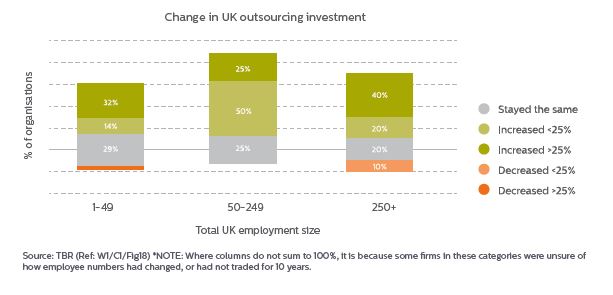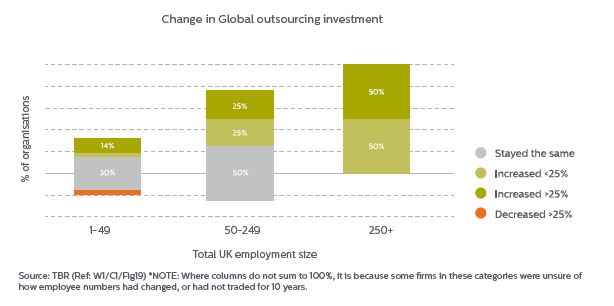
Changing levels of investment in UK drug discovery
pharmafile | March 31, 2017 | News story | Medical Communications, Research and Development | ABPI, drug discovery, report
Key drug discovery investment trends
Most companies have increased their overall drug discovery investment in the UK. However, more companies have increased investment globally, which may reflect a proportional decrease in investment in the UK. There is a mixed picture on in-house discovery investment, both in the UK and globally. Around 1/3 of companies have increased in-house investment globally and in the UK. However, more large companies have decreased in-house investment in the UK than globally, which may also reflect a proportional decrease in UK-based activity compared to global activity. In contrast, the large majority of companies have increased investment in both outsourcing and collaborative work both in the UK and globally.
Overview of resource investment
Overall, there is a mixed picture for the level of investment in drug discovery in the UK. Across the whole sample of initiator organisations, we see that more have increased overall investment (combining in-house and external investment) in drug discovery overseas than have in the UK. Likewise, the number of organisations reporting a fall in total drug discovery investment in the UK is greater than the number reporting a fall in global investment. Therefore, whilst many organisations have increased drug discovery investment in the UK, the UK may be losing out proportionally to other locations. However, there are striking differences between these trends for pharmaceutical and biotech firms compared with academe and CROs. As shown in Figure 14, of the academic respondents who have been working in drug discovery for at least ten years, all of them have seen a growth in investment in the UK.
In-house investment
The picture on investment for in-house discovery is mixed, and varies across organisations. Over a third of firms say that investment in in-house drug discovery activity has increased over the last ten years, both in the UK and globally.
However, around a quarter report a decrease in UK in-house investment. When divided by size, more firms have increased in global in-house investment than have increased UK-based in-house investment. In our sample, all medium sized initiators have increased their in-house UK-based investment compared to ten years ago. The majority of small firms report either that investment has not changed or that they were not trading ten years ago.

Outsourcing investment
Very few companies report a reduction in either UK-based or global outsourcing.
Over half of companies say that investment in UK-based outsourcing of drug discovery activity has increased over the last ten years. However, fewer firms said the same about global outsourcing investment.
This may suggest a proportional increase in UK outsourcing investment compared to global outsourcing investment.
However, this relative increase in UK outsourcing investment appears to be driven mainly by smaller sized firms, so direct comparison of absolute investment levels between the UK and global markets is difficult to infer. These findings are consistent with interviews with CROs that reported a shift in their client base from large pharmaceutical companies to biotech and academe over the last five years. While small and medium firms have tended to increase, or maintain, investment in outsourcing, both UK-based and globally, 25% of small organisations do not outsource any drug discovery overseas.

In contrast, more large firms report that their investment in global outsourcing has increased than for UK-based outsourcing.
Interestingly, amongst large firms in our sample, there appears to be a relationship between changes in UK-based in-house investment and investment in outsourcing.
Of the four large firms who have decreased UK-based in-house investment, three have increased investment in UK-based outsourcing, and three their investment in overseas outsourcing.
From our interview data, the models and objectives of outsourcing also appear to be dynamic and evolving. A number of large pharmaceutical companies have adopted a model of in-sourcing staff from CROs and these staff on their R&D sites. A number of interviewees suggested that the objective for this model was to increase productivity and investment flexibility. These external staff can represent a significant proportion of the total discovery staff on site. This in-sourcing model not only provides additional resource but also access to specialist knowledge and innovative technology.

Collaboration investment
The large majority of responding initiator companies invest more in collaborative drug discovery now compared to ten years ago. This applies both globally and in the UK. The numbers for the UK are greater than those for global collaborations, again particularly for smaller companies.
UK Pharmaceutical drug discovery investment – a relationship between in-house and collaborative spend? The data collected on investment in UK based collaboration suggests a relationship with levels of UK-based in-house investment;
• The four large firms who have decreased UK in-house investment have increased investment in UK collaboration.
• Of the four large firms who have increased UK in-house investment, only two have increased investment in UK collaboration.
In our sample, all large firms (n = 8) who have been involved in drug discovery collaboration globally for ten years or more have increased their investment in this activity. Medium and small sized organisations in our study have been more likely to increase investment in UK-based collaborations than global collaborations.
Although the absolute numbers are small, three times as many have decreased investment in UK collaboration (10%) than have decreased global collaboration investment (3%)
Related Content

Switzerland’s Basel Region Crowned ‘Europe’s Top Destination to Launch a Drug Device Company’, According to Pharmapack Report
Pharmapack Europe: ‘Basel the best location for drug device innovation in Europe thanks to combination …

Drug discovery and development partnership announced between Apollo Therapeutics and Oxford University
Portfolio therapeutics company Apollo Therapeutics has announced earlier this week that it will provide capital …

Certara to acquire Chemaxon for drug discovery portfolio
Certara and Chemaxon have announced that they have signed a definitive agreement under which Certara …







